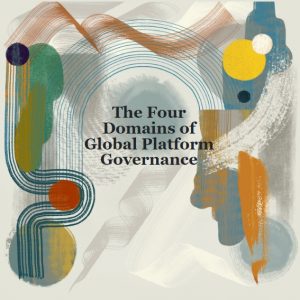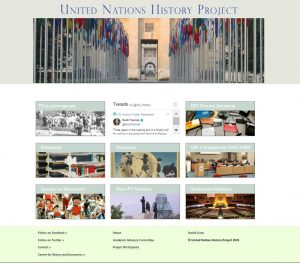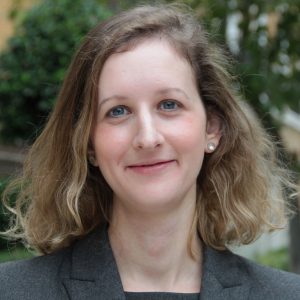July 19, 2022
Written by Heidi Rennert

From World War communication technologies to COVID-19 public advisories, Dr. Heidi Tworek has worked widely on the stakes of global communication in times of crisis.
Her media appearances on the news, radio, and podcasts have covered topics of technologies and politics, including, most recently, the rise of “fake news” in the Trump era, public communication around the pandemic, and disinformation about the invasion of Ukraine. In 2022, she was awarded a Tier 2 Canada Research Chair in History and Policy of Health Communications. She currently holds a joint appointment as associate professor in the School of Public Policy and Global Affairs and History at UBC.
In June 2022, Dr. Tworek co-edited and contributed to a series of provocations on global technologies and governance, titled “The Four Domains of Global Platform Governance,” which were published serially between June and July in the Centre for International Governance Innovation (CIGI).
The project, which involved an interdisciplinary panel of scholars, policy makers, and activists, are the focus of the following interview.
The following interview has been edited for clarity and length.
Heidi Rennert: Tell me a bit about your background and what brought you to doing public scholarship?
Heidi Tworek: I’ve been interested in thinking about how to make history available to a broader public ever since I was a graduate student. Some of the first work that I did to engage with the broader public was project-managing a website around the history of the United Nations about 10 years ago, making sure resources around researching and teaching the history of the UN and other international organizations were broadly available.
As I worked on my own research, I began thinking about how we could make media history applicable to the present. That really accelerated after 2016 when huge discussions arose around disinformation and whether social media platforms were “unprecedented” in their creation of problems in our information environment. As a historian who’d worked on how prior technologies had upended media ecosystems, I saw an opportunity to step into that space and say, “Not everything is unprecedented, let me give you some perspectives here.”
I try to be aware of the multiple types of publics. Some of my work is public in the sense that it is aimed more towards policy makers and those interested in making policy around social media platforms. Some of it is obviously aimed towards a broader public in trying to explain the history of media, why we should care today, and so on. I’m always thinking about “publics” in the plural rather than just one type of public.

Homepage of United Nations History Project (retrieved 2022)
HR: What does public scholarship mean to you? What do you value about it?
HT: The best public scholarship really tries to think about who that public is. It doesn’t necessarily mean the largest number of people. It can sometimes mean a very specific public. One of the great things about public scholarship is that it thinks about a group of people who are beyond the academy, beyond other scholars, and seeks to engage with them in a way that is meaningful to that public. That may mean an exhibition, a podcast, a policy report in my case, or an op-ed.
I think of public scholars as people who really figure out the public they’re looking towards, how to engage them, and then going down that route rather than necessarily going down what has now become the traditional route–op-ed, et cetera. Sometimes that’s the right way, but quite often, for different publics, that really isn’t. The exciting thing about current public scholarship is that we’ve got just an efflorescence of different ways of thinking about how to engage broader communities.
HR: How would you describe this project and its objectives?
HT: We have edited a set of short provocations from scholars and civil society organizations and people working in those organizations around the world talking about platform governance–so, how to govern and potentially regulate social media platforms. These are going to be published on the website for The Centre for International Governance Innovation.
This is an example of one type of public scholarship which is saying, “Okay, we’re going to bring in not just scholars but also people who are really working on these issues in in-depth ways, who are often working in civil society organizations. We are going to give everyone a voice, but we’re going to do it in thousand-word provocations, so we’re setting out an agenda that’s quite short.”
All of this is then overlaid by the three of us who are editors writing about why we think this needs to be more global. So, we’ve got 16 people from around the world with different perspectives on what platform governance even means. We’re translating some quite scholarly terms for a broader public of policymakers and others interested in these questions around social media platforms–which is becoming ever more people with continuing revelations like Facebook files!
HR: What did you learn during this project? What was your collaborative process?
HT: It is important to recognize there are many ways of conveying knowledge. Scholars aren’t the only people producing knowledge or with access to knowledge. We bring into this project lived and learned experience. There’s a great deal of knowledge that comes from being located in different places. Those were things that we sort of hypothesized before beginning, but then the provocations and the drafts that we read made that very clear.
The other thing that was helpful for me was that this was one of the most fruitful Zoom exchanges that I’ve had. We all have Zoom fatigue, but having thousand-word drafts, and then a couple of hours to discuss them with fantastic people, was highly invigorating.
Scholars aren’t the only people producing knowledge or with access to knowledge. We bring into this project lived and learned experience. There’s a great deal of knowledge that comes from being located in different places.
HR: What kind of impact do you imagine your project having? Why is this important?
HT: We hope that this will be read by policymakers around the world, that it will raise awareness for those who are already regulating social media, and that there are other places around the world impacted by these regulations. For countries thinking about regulation, this project will give a broad sweep about what that means. For a broader public interested in these issues, it will indicate aspects they should think about and give them greater information about global ramifications. This isn’t just a North American/European question; it affects every country in the world in different ways.
Also, we hope that these will be enjoyable things to read and will hopefully get people even within the field to think a little bit differently about how they approach social media platforms.
PHH: Any future plans for this project?
HT: We’re going to write longer chapters as part of an edited volume that will hopefully be widely available and then can be used in graduate classes, et cetera. So, it will combine the more scholarly pursuit (and hopefully some policy makers who are really in the weeds of this topic) with these provocations, which are more public-facing.
Follow Dr. Tworek’s latest work and media appearances at her website. You can follow her on Twitter @HeidiTworek.
 Dr. Heidi Tworek (she/her/hers) is a member of the PHH Steering Committee and holds a joint position as Associate Professor in the School of Public Policy and Global Affairs and History at UBC.
Dr. Heidi Tworek (she/her/hers) is a member of the PHH Steering Committee and holds a joint position as Associate Professor in the School of Public Policy and Global Affairs and History at UBC.